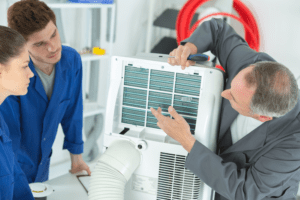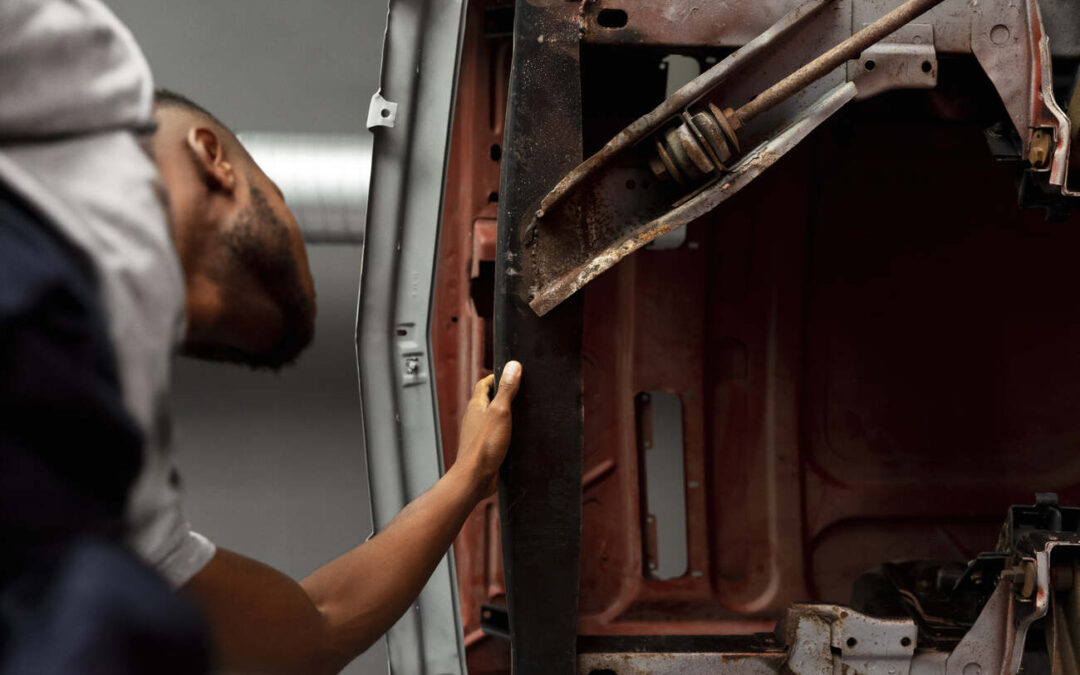Investing in a preventative maintenance program for your commercial heating and cooling systems is one of the best ways to keep your running and repair costs to a minimum. All HVAC solutions, regardless of their quality or initial price tag, require routine upkeep; you can’t just install a new system and expect it to remain functional and economical for the next 15 years.
Some people wrongly assume they can save money by neglecting maintenance believing their system is impervious to damage, but that’s never the case. The bottom line is – if you don’t take care of your HVAC unit, inefficiencies and costly failures will eat into your hard-earned cash. In most cases, if you neglect upkeep for years, defects will reduce the lifespan of your system, forcing you to pay for a replacement prematurely and unnecessarily.
 The most straightforward way to keep your HVAC solution in optimal condition is to sign up to a professional preventative maintenance program. Qualified engineers know how to service your HVAC system without causing damage. Moreover, because they can ensure your system remains efficient, they can help you save on your energy bills.
The most straightforward way to keep your HVAC solution in optimal condition is to sign up to a professional preventative maintenance program. Qualified engineers know how to service your HVAC system without causing damage. Moreover, because they can ensure your system remains efficient, they can help you save on your energy bills.
We often find that people forget about HVAC maintenance because, after all, it’s just a unit that sits out of sight on your roof. Who cares if it gets dirty? Unfortunately, if dirt and grime make its way into and settle in your solution, problems will arise, and they’ll likely cost a lot to rectify.
One of the most common mistakes people make regarding commercial HVAC maintenance is forgetting to clean the coils. However, neglecting the cleanliness of your system’s coils can lead to severe repercussions for the health of your unit and energy costs.
In this article, we’ll briefly discuss what your coils are and why they’re crucial components of your commercial HVAC units. We’ll also look at the risks associated with leaving them to gather dust and dirt before explaining what’s required to keep them clean. You’ll likely soon realize why professional preventative maintenance programs are a high-value – if not necessary – investment.
Understanding the Purpose of the Coils for Commercial Heating and Cooling
Your HVAC unit contains two coils: an evaporator coil and a condenser coil. The evaporator coil removes heat from the air before cooling it and dispersing it throughout your building.
First, your HVAC system’s compressor pulls a refrigerant through the evaporator coil. When warm air goes through the coil, the refrigerant absorbs heat and cools it rapidly, reducing the air temperature before transferring it into your indoor space.
The condenser coils complete the process. Primarily, they release the absorbed heat outdoors. Because condenser coils come into direct contact with outdoor air, they face exposure to the elements and can quickly become clogged full of dirt, grime and debris, which can prevent all the coils in your unit from doing their job, making your HVAC unit less efficient at best and leading to system failure at worst.
How to Clean Your Coils: Steps for Cleaning Commercial HVAC Coils
Maintaining evaporator and condenser coils in commercial units is far from straightforward and usually requires a professional’s touch. Some people attempt to clean their coils DIY-style using a pressure washer, but such machines can easily damage the delicate fins in the beds of your coils. Additionally, a pressure washer may end up just pushing dirt, grime and dust deeper into your system, causing damage in the process. It’s not to say that a pressure washer can’t be used to aid in the cleaning of your coils – it just means you need to know what you’re doing.
You can use water and mild detergents to clean your coils monthly to prevent a build-up of grime from becoming a severe issue (this doesn’t eliminate the need to call a professional for annual preventative maintenance).For thorough coil cleaning, it’s essential to follow these steps, ensuring safe and effective maintenance:
- Turn Off the System
Always power down the HVAC unit before cleaning to avoid injury and prevent any damage to the system’s components. In commercial setups, ensure that the entire building’s schedule is considered to minimize downtime during maintenance. - Remove Access Panels
Most commercial HVAC units have access panels that allow easy entry to the coils. Remove these panels carefully, noting any screws or bolts that need to be reattached afterward. Be cautious of any electrical components and wiring near the coils. - Inspect and Assess Coil Condition
Before cleaning, visually inspect the coils for any damage or severe buildup. If coils are bent or damaged, this may require straightening or replacement by a professional. - Clear Debris with a Soft Brush
Using a soft brush, gently remove loose dust and debris from the coil surface. Avoid using metal-bristled brushes, as these can damage the coils’ delicate fins. - Use a Commercial Coil Cleaner
Apply a specialized commercial coil cleaner, following the manufacturer’s instructions. These cleaners are designed to dissolve dirt, grime, and grease that can’t be removed with a brush. Ensure the cleaner is safe for the type of coil material in your HVAC system to avoid corrosion. - Rinse the Coils
After letting the cleaner sit for the recommended time, rinse the coils thoroughly with water. In commercial settings, using a pressure washer can be effective, but it should be on a low setting to prevent damage to the coil fins. Ensure all cleaning solution residue is removed, as leftover cleaner can continue to react and potentially damage the coils. - Straighten Bent Coil Fins
After rinsing, check for any bent fins. Bent fins can restrict airflow and reduce efficiency. Use a fin comb to carefully straighten any bent fins and restore optimal airflow through the coils. - Dry and Replace Access Panels
Allow the coils to dry completely before reattaching the access panels. This step is important to prevent moisture buildup within the system, which can lead to mold growth or corrosion. - Perform a Final Inspection
Before restarting the system, perform a final inspection to ensure everything is securely in place and the coils are free from any cleaning solution or moisture. - Restart the System and Monitor
Turn the HVAC system back on and observe its operation. Pay attention to any unusual sounds or temperature irregularities that may indicate an issue that needs further attention.
You can also employ cleaning methods using commercial cleaners, compressed air and high-pressure jet washers. However, leaving such tasks to a trained professional comes highly recommended.
The Dangers of Neglecting Coil Maintenance
The risks of not cleaning your coils include:
- Unnecessarily high energy costs
- Reduction of equipment lifespan
- Poor air quality
- System failures
- Costly repairs
- Increased emissions
If you want to have the coils in your commercial HVAC units professionally cleaned, you should call us to learn more about our preventative maintenance program, which almost guarantees to help you save money in the long run. Remember – it’s not just your coils that need maintaining. Duct cleaning, thermostat testing, and a range of components need assessing at least annually. As part of our program, we’ll keep your entire commercial heating and cooling system in top condition to reduce your energy usage and bills, minimize the need for repairs, and help you protect the environment.
Why Coil Cleaning is Important in Commercial Settings
In commercial environments, HVAC systems often run longer hours and need to maintain comfortable temperatures across larger spaces. The coils in these systems, both evaporator and condenser, play a vital role in transferring heat. When they become clogged with dust, dirt, and debris, they can’t efficiently transfer heat, forcing the system to work harder. This can lead to a 20-30% increase in energy use and decrease the equipment’s overall efficiency and lifespan.
Frequency of Coil Cleaning in Commercial HVAC Systems
For commercial HVAC systems, it’s recommended to clean the coils at least twice a year—typically before and after peak heating and cooling seasons. However, for facilities with high dust levels or industrial operations, quarterly cleanings may be necessary to maintain performance.
Benefits of Regular Coil Cleaning in Commercial HVAC Systems
- Enhanced Efficiency
Clean coils enable the HVAC system to operate at peak efficiency, keeping energy costs down—a significant advantage for large commercial spaces. - Improved Air Quality
By keeping coils clean, you reduce the amount of dust, mold, and allergens that could circulate through the HVAC system, improving the indoor air quality for employees and customers. - Extended Equipment Lifespan
Regular maintenance and coil cleaning reduce the stress on the HVAC system, minimizing wear and tear and extending the equipment’s operational life. - Reduced Repair Costs
Clean coils reduce the likelihood of system breakdowns, saving businesses on costly repairs and minimizing system downtime.



